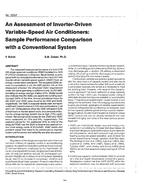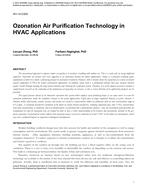Click here to purchase
The effective HVAC operations not only achieve energy savings but also create a more comfortable indoor environment for occupants. Currently, commercialbuildings, particularly open-plan office buildings are faced with problems like unnecessary energy waste and unsatisfactory shared indoor thermal environment.Therefore, it is significant to develop a new paradigm of HVAC system framework so that everyone could work under their preferred thermal environmentand the system can achieve higher energy efficiency. Moreover, even if occupant behaviors and preferences have considerable impacts on HVAC performances,most of sensing systems for occupant-related factors may either result in privacy issue or are too intrusive. Hence, it is necessary to develop new non-intrusiveand less private sensing framework for monitoring individual thermal comfort in real-time. Lastly, taken human-in-the-loop into consideration, the proposedsystem aims to optimize energy performance and improve occupant thermal comfort by developing interactive control logics for an integrative HVAC systemfeaturing personalized cooling with non-intrusive sensing techniques. Therefore, this paper proposes and evaluates two interactive control algorithms byconducting an in-situ and comparative study in a regular shared office space during cooling season. The proposed control algorithms are based on standardoptimization and reinforcement learning, respectively. The in-situ results have shown that control algorithms with standard optimization controller canminimize energy consumption while improve thermal comfort while the reinforcement learning-based controller has difficulty in covering all possible finitestates if the controller is only dependent on occupants’ feedbacks.
Citation: 2019 Annual Conference, Kansas City, MO, Conference Papers
Product Details
- Published:
- 2019
- Number of Pages:
- 9
- Units of Measure:
- Dual
- File Size:
- 1 file , 2.4 MB
- Product Code(s):
- D-KC-19-C033


